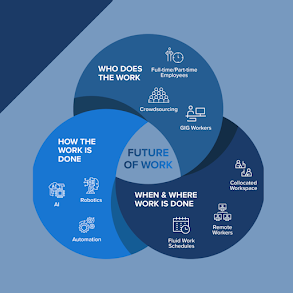The Future of Work: A Gamechanger
The workplace is evolving more quickly than ever. From the rise of the gig economy to the impact of automation, the way we think about work is being transformed. In the wake of the COVID-19 pandemic, many of these changes have accelerated, as companies and workers have had to adapt to new ways of doing business. At the same time, there are new challenges emerging, such as the need for more flexible and remote work arrangements, and the increasing importance of digital skills. In this blog, I will explore some of the key trends and challenges that are shaping the future of work, and offer insights and strategies for navigating this rapidly changing landscape.
Introduction
The future of work is an exciting and ever-evolving concept. The rapid advances in technology, artificial intelligence, and automation have drastically changed the way we work and interact with each other. As technology continues to evolve, the way we work and the types of jobs available to us are likely to change as well. Companies are beginning to embrace remote work and digital collaboration tools, allowing for more flexible and efficient work environments. Automation is also becoming increasingly common, allowing for more efficient processes and freeing up workers to focus on more creative tasks. As the future of work continues to evolve, it is important to stay informed and adapt to the changing landscape.
Characteristics
The future of work will be characterized by automation, increased flexibility, and the need for more skills.
Automation will be driven by advances in artificial intelligence (AI), robotics, and machine learning. This will create new jobs that require skills that are not currently in use, such as programming and data analysis. As technology advances, workers will need to continually update their skills and knowledge to remain competitive.
Increased flexibility will allow workers to work remotely, from home, and on a part-time or freelance basis. This will make it easier for workers to balance their work and personal lives, and to access more job opportunities. It also means that employers will need to provide new tools and resources to manage remote teams and ensure productivity.
The need for new skills will also increase in the future. Employers will need to provide training and development opportunities for employees to keep up with the latest advancements in technology. It will be important for employees to stay current on industry trends and develop the necessary skills to remain competitive. Workers will also need to be open to learning new skills, such as programming and data analysis, in order to take advantage of new opportunities.
Trends
The future of work is difficult to predict, but there are some general trends that are likely to continue:
The first is the trend toward greater flexibility in work arrangements. Flexible work arrangements, such as part-time work, job sharing, and flexible schedules, are becoming more popular as employees seek greater work-life balance. These arrangements can help companies attract and retain top talent.
The second trend is the increasing importance of new business models: The future of work is likely to see the emergence of new business models that are more agile, decentralized, and digitally-driven. These models will require workers to be adaptable, innovative, and comfortable working in fast-paced, dynamic environments.
The third trend is the continuing globalization of the economy. The world of work is becoming increasingly globalized, as companies expand their operations across borders and workers seek employment opportunities in other countries. This trend is likely to continue in the future of work, requiring workers to be culturally aware and adaptable to different working environments.
The COVID-19 pandemic has accelerated the shift toward remote work, and this trend is likely to continue in the future of work. Remote work offers many benefits, including greater flexibility, reduced commute times, and lower costs for employers.
The rise of the gig economy has been one of the biggest changes in the world of work in recent years. This trend is likely to continue in the future of work, as more workers seek greater flexibility and autonomy in their careers.
Challenges
Some general challenges that may arise in the future of work include:
Digital Divide: Not all workers have equal access to digital tools and resources, which may create inequality in the workplace. This may require companies and governments to take steps to address the digital divide and provide equal access to technology.
Training and Development: In order to adapt to changing job requirements and new technologies, workers will need ongoing training and development. Companies may need to invest more in training programs and offer more opportunities for upskilling and reskilling.
Privacy and Security: As more work is done remotely and through digital tools, there may be concerns around data privacy and security. Companies will need to take steps to protect sensitive information and ensure that workers' privacy is respected.
Mental Health: The future of work may create new challenges for workers' mental health, including increased stress and burnout. Companies may need to offer more support and resources to help workers manage their mental health.
Inequality: The future of work may exacerbate existing inequalities, such as gender and racial disparities in pay and promotion opportunities. Companies and governments may need to take steps to address inequality and promote diversity and inclusion.
Environmental Impact: The future of work may create challenges around sustainability and reducing the environmental impact of work. Companies may need to develop more sustainable practices and reduce their carbon footprint.
Social Isolation: The rise of remote work may create challenges around social isolation and loneliness. Companies may need to develop strategies to maintain team cohesion and social connections in a remote work environment.
Myths
The future of work is a topic that has garnered a lot of attention in recent years, and with good reason. As the world becomes increasingly digital and automated, many people are wondering what the future of work will look like. However, there are also a lot of myths and misconceptions about the future of work that can be confusing or misleading. Here are some common myths about the future of work:
Reality: While it's true that automation and artificial intelligence will likely replace some jobs, they will also create new ones. In fact, some estimates suggest that AI and automation could create more jobs than they replace.
Myth: Everyone will work from home.
Reality: While remote work has become more common due to the pandemic, not all jobs can be done remotely. Some jobs, like healthcare or manufacturing, require people to be physically present. Additionally, some people may prefer to work in an office or other workspace for social or logistical reasons.
Myth: The gig economy is the future of work.
Reality: While the gig economy has grown in recent years, it's still a relatively small part of the overall job market. Many people prefer the stability and benefits of traditional employment, and there are concerns about the lack of protections for gig workers.
Myth: Soft skills aren't important in the future of work.
Reality: While technical skills will be important in many fields, soft skills like communication, collaboration, and creativity will also be highly valued. As automation and AI become more prevalent, these skills will set human workers apart.
Myth: The future of work will be the same for everyone.
Reality: The future of work will likely vary depending on factors like industry, location, and level of education. Some jobs may become fully automated, while others may require high levels of human skill and creativity. Additionally, the future of work may look very different in different parts of the world.
Myth: The future of work will be dominated by young people.
Reality: While younger workers will certainly play a key role in the future of work, older workers will also be important. In fact, as people live longer and healthier lives, many will choose to work longer or return to work after retirement.
Overall, the future of work is complex and multifaceted, and it's important to be aware of the various myths and misconceptions that exist. By understanding the realities of the future of work, we can better prepare ourselves for the challenges and opportunities that lie ahead.
Summary
The future of work will be shaped by a combination of technological advances, changing economic factors, as well as societal shifts. It is important for businesses, governments, and individuals to be flexible and proactive in adapting to these changes in order to remain competitive and successful. Businesses will need to prioritize the development of their digital capabilities and create a culture of innovation and creativity. Governments will need to create policies that foster an environment of growth and support the development of new skills and capabilities. Individuals will need to continuously update their knowledge and skills to remain competitive in the future job market. Ultimately, the future of work will depend on all of us working together to create an environment that encourages innovation and growth.






Very nice 👍
ReplyDeleteThank you !!! ❤️
Delete